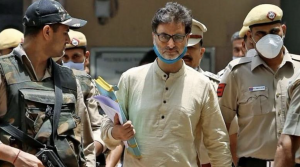NEW DELHI, Aug 9: In response to the National Investigation Agency’s request for the death penalty against him in a case involving funding for terrorism, separatist leader Yasin Malik virtually appeared before the Delhi High Court on Wednesday from behind bars.
The Jammu and Kashmir Liberation Front chief, who is currently serving a life sentence in the case, was ordered last week by the high court to appear before it via video conference instead of in person in accordance with the production warrant issued earlier this year.Malik received notification from the high court on May 29 regarding the NIA’s request for the death penalty against him in the case involving funding for terrorism, saying, “Let warrants of production be issued against Yasin Malik, before this Court on the next date of hearing.” The jail officials then submitted a request for authorization for his virtual appearance, arguing that because he was a “very high risk prisoner,” it was crucial to avoid physically bringing him before the court to preserve public safety and order.
Recently, the imprisoned separatist leader appeared before the Supreme Court in relation to a kidnapping case brought against him, leading Union Home Secretary Ajay Kumar Bhalla to raise the “serious security lapse” with the Solicitor General of India, Tushar Mehta. On July 21, he was carried without the court’s consent to the high-security apex court grounds in a prison vehicle accompanied by armed security guards.
Later that week, the Department of Delhi Prisons ordered an investigation into the lapse and suspended four employees due to Malik’s physical appearance before the highest court.
Malik received a life sentence in the current case on May 24, 2022, after being found guilty of several charges under the strict Unlawful Activities (Prevention) Act (UAPA) and the IPC.
Malik was found guilty and given a life sentence after entering a plea of guilty to all of the charges, including those brought against him under the UAPA.The NIA highlighted in its appeal that a terrorist cannot receive a life sentence just because he entered a guilty plea and choose not to go to trial.
The NIA has argued for increase of the sentence to the death penalty, arguing that if such feared terrorists are not executed due to their guilty pleas, the sentencing guidelines would completely erode and terrorists would have a way around it.The NIA argues that a life sentence is excessive given the terrorists’ crimes against the country and the families of fallen soldiers, and that the trial court’s finding that Malik’s crimes did not qualify as one of the “rarest of the rare cases” warranting the death penalty is “ex-facie legally flawed and totally unjustifiable.” The agency has emphasised that it has been established beyond a reasonable doubt that Malik was the leader of terrorist activities in the Valley and had been “masterminding, planning, engineering and executing armed rebellion in the Valley in an attempt to usurp the sovereignty and integrity of a part of India” with the assistance of feared foreign terrorist organisations.An act of terrorism is not a crime against society; it is a crime against the entire nation; in other words, it is an act of “external aggression,” “an act of war,” and a “affront to the sovereignty of nation.” According to the plea, not executing such a dreaded terrorist will lead to a miscarriage of justice.
The trial court stated that Malik’s actions struck at the “heart of the idea of India” and were aimed to forcibly secede Jammu and Kashmir from the Union of India, rejecting the NIA’s request for the death penalty.However, it had been highlighted that the case did not meet the “rarest of rare” criteria for the death punishment.
The death penalty is the top penalty for such an offence.
Sections 121 of the Indian Penal Code (waging war against the Indian government) and Section 17 of the Unlawful Acts Against Persons Act (raising finances for terrorist acts) both resulted in life sentences.
Unless the sentence is mitigated by the authorities, life in prison means confinement until one’s last breath, according to the Supreme Court.According to sections 120 B (criminal conspiracy), 121-A (conspiracy to wage war against the government of India), sections 15 (terrorism), 18 (conspiracy for terrorism), and 20 (being a member of a terror organisation), the court had sentenced Malik to 10 years in prison in total.

